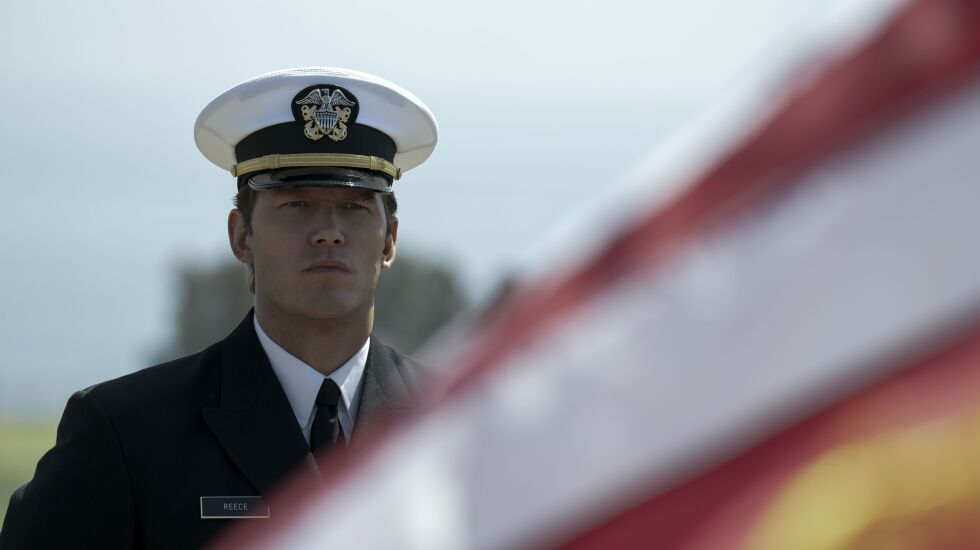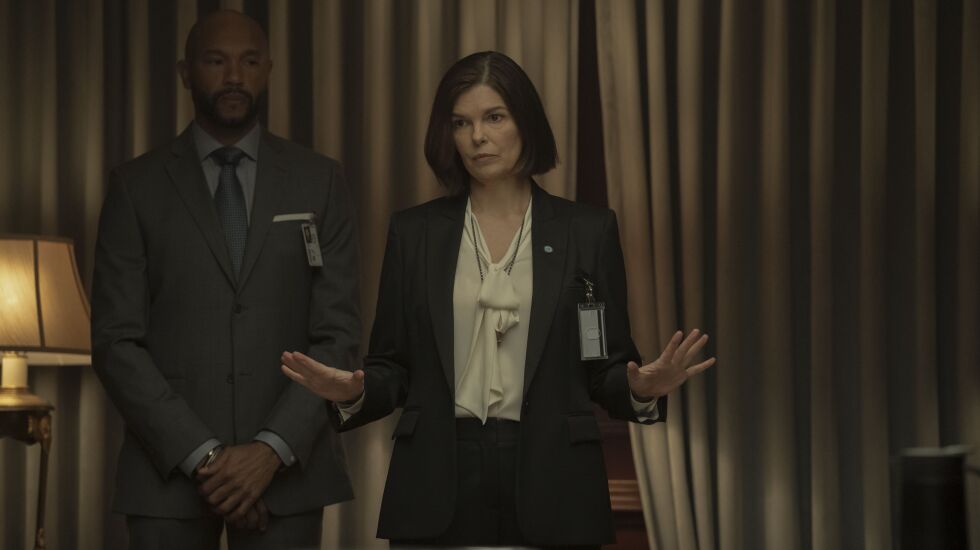
When Chris Pratt was putting his considerable comedic talents to great use as Andy Dwyer in “Parks and Recreation,” Andy would sometimes rely on his alter ego, the FBI Agent Burt Macklin, to solve a big case. The joke worked because it was absolutely ridiculous for the amiable, out-of-shape, not particularly intelligent and endearingly childlike Andy to actually BE a hard-edged, rogue government operative.
Cut to more than a decade later, and Hollywood has tried repeatedly to turn Pratt into a legitimate action star, from the Indiana Jones-like Navy veteran and raptor-whisperer Owen Grady in the “Jurassic World” films to Peter Quill/Star-Lord in the “Guardians of the Galaxy” franchise to the former Green Beret sergeant Dan Forester in “The Tomorrow War” and now with the eight-part Prime Video military thriller series “The Terminal List,” which stars Pratt as a SEAL commander out for revenge after a covert mission goes tragically wrong.
I’m not buying it.
While Pratt’s gift for light comedy jibes well with his “Guardians” character, he doesn’t have the gravitas of a Daniel Craig or a Liam Neeson or a Matt Damon to convincingly portray a hardcore killing machine in more substantial fare, and he’s miscast in this occasionally thrilling and well-paced but ultimately predictable, formulaic and cliché-riddled series. In a role that calls for an actor to demonstrate a wide range of the deepest possible human emotions, Pratt comes across as slightly stiff and not fully immersed in the character, though I’m quite sure he’s giving his all to the part. He’s Jack Reacher Lite.
Based on the 2018 novel of the same name, “The Terminal List” has a promising premiere episode, directed with an intense and furious and chaotic style by Antoine Fuqua (“Training Day,” “The Equalizer”). Pratt’s James Reece is a Navy SEAL commander who is nearing 40 but is still “the tip of the spear,” as he leads his squad on a high-stakes covert down-range mission that turns out to be an ambush, resulting in the deaths of nearly the entire platoon.
Once Reece is back Stateside, he reunites with his loving wife Lauren (Riley Keough) and their adorable daughter Lucy (Arlo Mertz), but he’s plagued by PTSD and a gut feeling his government superiors are lying to him about what really happened on that mission. While undergoing an MRI, Reece is attacked by trained assassins and manages to survive — but by the time he makes it home, his wife and his daughter have been murdered. The questions are huge and world-shattering: Did Reece really get attacked in that hospital, or did he imagine it? And is he the one who killed his wife and daughter in a fit of delusional madness?
That’s solid, serious, sobering stuff, and it sets the wheels in motion for a classic military-conspiracy storyline. With obvious song selections such as Black Sabbath’s “War Pigs” on the soundtrack and a number of scenes involving shootouts and hand-to-hand combat, the body count piles up as Reece tries to make sense of things, even as the ringing in his ears and the haunting nightmares and the pounding pain in his temples indicate he’s dealing with physical as well as psychological issues.

Along the way, we meet a collection of stock characters, including Taylor Kitsch as Reece’s former SEAL teammate, who vows to help his best friend get to the bottom of the conspiracy no matter what the consequences; Jeanne Tripplehorn (who’s quite good) as the Secretary of Defense; Jai Courtney as the obligatory slick and ruthless villain, and Constance Wu as a crusading journalist who isn’t above pulling some unethical moves, e.g., slipping a few hundo to a hospital clerk in order to gain access to confidential medical records. Various directors take over the reins from Fuqua after the pilot episode, but their respective approaches seem interchangeable, as Reece’s occasional lapses into possibly delusional perceptions are portrayed in an irritating and shrill manner, and every time Reece gets tangled up with a hired hitman or a series of henchmen, well, we know who’s going to walk away and who is going wind up dead dead dead on the ground.
The attempts at sentiment often come across as hokey and/or weird, as when Reece scribbles clues on the back of a drawing his daughter made for him, or when he fondly remembers that time when a bird smashed into the window of the Reece household and dad tried to reassure his little girl the bird was just stunned and will be OK. (At least it’s a departure from the usual Dead Family Flashback Sequences recalling happier times at the beach or a birthday party.) “The Terminal List” ends on a note leaving things open for a Season Two, but I’m afraid that’s a job not even Burt Macklin could pull off.







